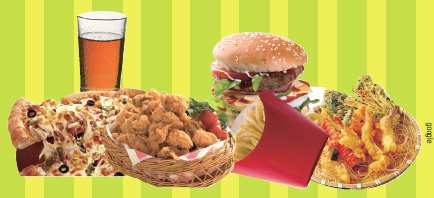
There are several inconveniences to deal with when you live far away from family and live near school. It is not a huge problem to delay doing the laundry or cleaning by one day, but the issue of eating obviously cannot be put off. A majority of students eat out since they do not have much free time and feel bothered to cook their own meals at home. There is a tendency for students to frequently eat snacks as a meal and it seems impossible at times for them to have regular meals. Health is something that most of these students overlook. We know for sure that healthy eating habits help maintain good health. However, we often overlook the warning of health problems because we have not had any big problems related to health yet. Let us look at the actual eating habits of a student living on his own and make a diagnosis of the daily routine of K (School of taxation, 11).

K, who lives alone near school, wakes up 30 minutes before class. For a person like him who hastily puts on clothes and hurriedly leaves home, having a decent breakfast is impossible. He feels hungry during class, but he can stand it since only an hour is left till lunch time. He goes to the Student Hall with the thought of eating his fill to find a seemingly never-ending line of people. He eventually goes to a restaurant located at the Rear Gate of the school. He used to eat WEB burgers, but now he is sick of eating them. After an afternoon class at 4 p.m., he eats a piece of cake and drinks some kiwi juice with his friend. He skips dinner since he is full having already eaten dessert. He goes to a PC room at 11 p.m. He eats an instant cup ramen around 12 a.m., feeling hungry as he is so absorbed in a game. He comes back home at about 2 a.m. and falls asleep thinking that he wants to wake up early in the morning and eat a bowl of cereal.
K’s average eating habits are not healthy at all. He is prone to eat whenever he is hungry instead of having meals at a proper mealtime. This tendency is especially strong in the morning and during weekends due to the fact that eating at the right time seems like a bother for him. In fact, he likes to have breakfast every morning. Before he became a university student, he had meals three times a day at designated mealtimes. However, he started his irregular eating habits when he entered university and has become accustomed to the taste of artificial flavors. Alcohol is one thing that cannot be omitted from his eating habits. He often drinks alcohol four or five times a week. He acknowledges that he does not have desirable life patterns and eating habits. Nevertheless, he said he does not feel a need to improve his eating habits, since he has not experienced any bad symptomsyet. We asked him about changing his eating habits for the betterment of his health. However he answered that he cannot feel an improvement of his health by eating good food. He replied that a regular exercise and sleeping pattern are what affect our health, so we can eat any food we want.
K’s case confirms that students who live on their own have harmful eating habits. However, even though K admitted that his eating habits are unwholesome, he still does not feel the necessity to improve them. Similar answers have been shown in a survey of University of Seoul (UOS) students who live on their own.
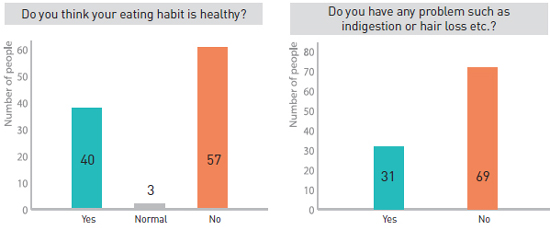
According to a survey, a number of UOS students also thought their eating habits are not healthy. A large proportion of students who answered claimed, similarly to K, that they do not see anything wrong with their eating habits. Thus, it seems that most of the students do not have a strong will to change their eating habits in a good way.
We have considered what effective methods are necessary to help lead students with weak wills to have wholesome eating habits. One of them is to increase the amount of fruits and vegetables they consume. Our generation is used to the taste of instant food. We also prefer eating meat to vegetables, and when we do eat vegetables, it is often salad drowned in dressing. Furthermore, we asked the nutritionist at the Student Hall to suggest a menu that would deal with the students’ lack of vegetable intake. Students’ reaction to this suggestion was not enthusiastic though. However, there were a majority of students who responded that they would purchase salad at the Student Hall cafeteria if it is sold in the 3,000 won range. Accordingly, if salad is added to the cafeteria menu at the Student Hall, a positive response is expected.
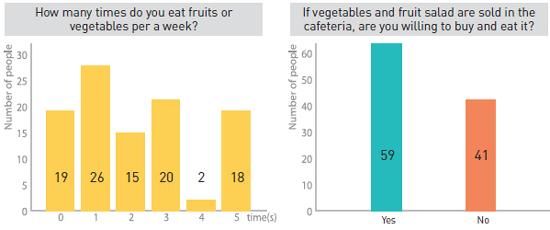
Why is there a problem with the eating habits of people who live on their own? Why do these people often have unbalanced eating habits? A nutritionist working in the Student Hall and a doctor who The UOS Times interviewed gave some answers to these questions. Shall we look at what they said?
A nutritionist who works in a Student Hall (Min Kyung sook)
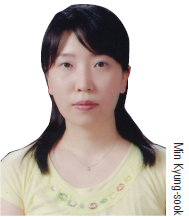
Q1. What kind of menu do students prefer in the cafeteria?
Students generally look for any dishes that contain meat. In addition to this, more and more students these days eat ramen for their meals. I guess the reason why there is an increase in the number of students preferring ramen is due to the fact that it is comparatively cheap when compared to other dishes and tastes good.
Q2. What concerns do you have about the students’ eating habits?
What concerns me the most is that a number of students do not maintain regular eating habits. I hear that students nowadays skip meals because of their busy lives. Whenever I see these students, I am deeply worried about their health. There are some occasions that students make do with fast food such as hamburgers and junk food like chips for their meals. However, these sorts of eating habits have difficulties providing essential nutrients that our body needs.
Q3. Last question. Please give some advice regarding eating habits to the students who live on their own in today’s era.
I do understand what it is like to live on one’s own and how irksome it is to prepare a meal for oneself at home. A lot of students just purchase some snacks and food for a meal at a convenience store, but I strongly recommend them to eat rice instead of instant food. Even though students are extremely busy studying and doing their assignments, they should have proper meals that are wholesome. The cafeteria in the Student Hall sells tasty and nutritious gimbap(dried seaweed rolls) at prices students can afford, so how about getting some gimbap for a meal rather than a greasy hamburger?
A doctor who works at a Cosmedi Clinic (Koo Jung mo)
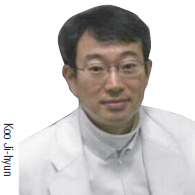
Q1. What are the diseases that can come from the improper eating habits of students who live on their own? How should the students cope with these problems?
When problems related to eating habits arise, a variety of diseases manifest. One's hair could become thinner and they could suffer from hair loss. Nutritional unbalance and malnutrition are symptoms that often appear as well. People are apt to imagine a bony face when they think about malnutrition. However, malnutrition means suffering from a dearth of nourishment. Also, various skin ailments such as pimples, acne and dry skin could appear. All of these symptoms that I listed can be prevented in advance if you have proper eating habits.
Q2. Could you please give an analysis and advice in regard to students who live on their own?
A majority of students, including those who live on their own, prefer food that their appetite wants, not what their body needs. Our body needs essential nutrients to sustain life harmoniously. However, when students become nutritionally unbalanced, they can suffer from undernourishment or hypernutrition. For instance, students are exposed to the danger of obesity and adult illnesses, since they are fond of sweet, greasy, spicy and strong-tasting food. Also, fat is accumulated in the body when you have irregular meals and have meals late at night. Our body appeals for a supply of healthy food. What kind of food am I talking about here? First, wholegrains that are abundant in nutrients. Secondly, protein-rich food such as chicken and fish, but not red meat (Of course, it is recommended to peel off the skin of the chicken and trim off the fat of fish.) Thirdly, fresh vegetables and fruits. These kinds of food are highly recommended. I know that a lot of students take this advice for granted, but not a lot of students abide by this advice. Therefore, I advise you to develop healthy eating habits by keeping what I have said in mind.
Through our interviews with the aforementioned experts, we have discovered that students who live on their own need to be more heedful of their eating habits. Then, putting what we have learned from the nutritionist and doctor into action is very important. Therefore, we have prepared a healthy and quick recipe for you that does not require much dish-washing.

The UOS Times visited K again and conveyed advice from the two experts and the simple egg soup recipe to him. He mentioned that he has reconsidered his unwholesome eating habits thanks to this opportunity. He said, "I am going to a supermarket near my home right now to buy some vegetables and fruit. I will take this chance to have healthy eating habits. Since my resolution will be printed in this article, I will make sure to keep my word." Stirred on by his remarks, we truly hope that students who live on their own will lead a wholesome life by building healthy eating habits.

